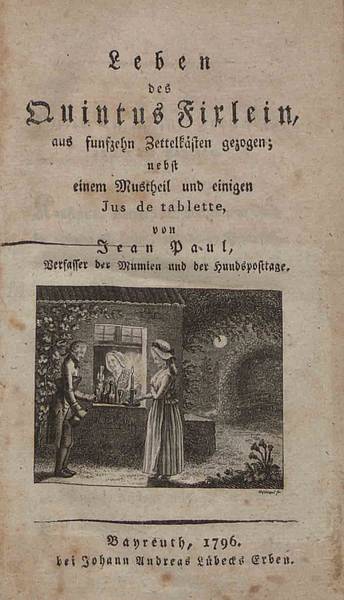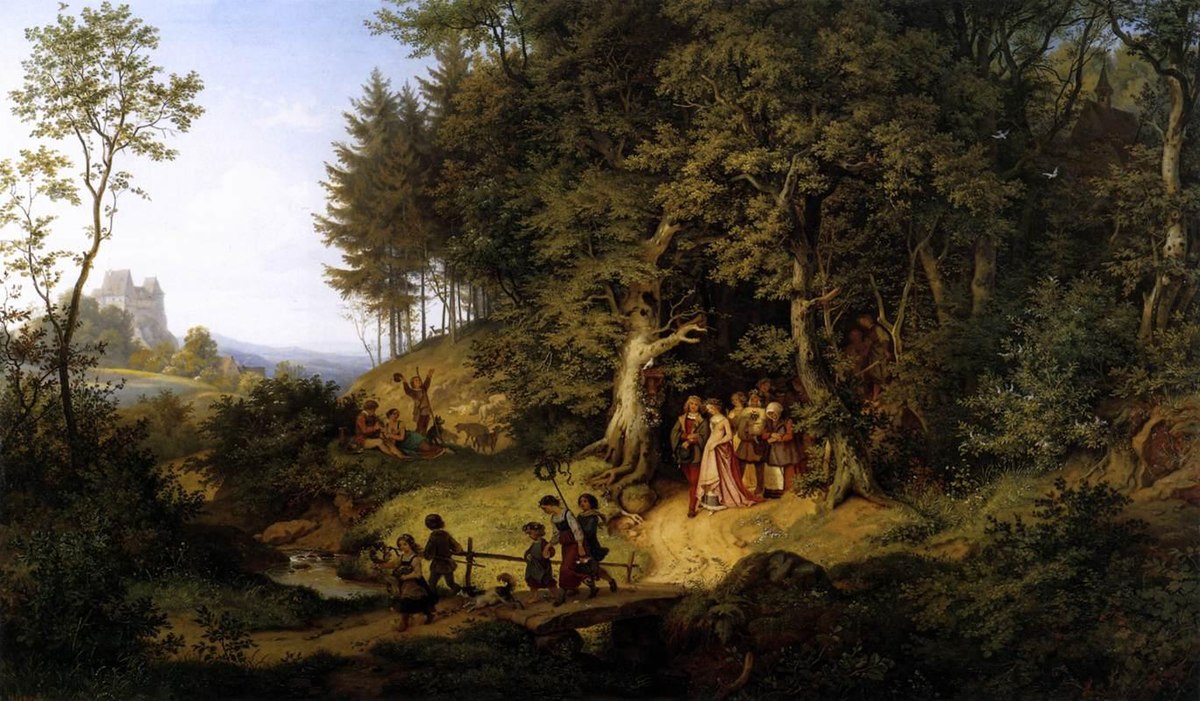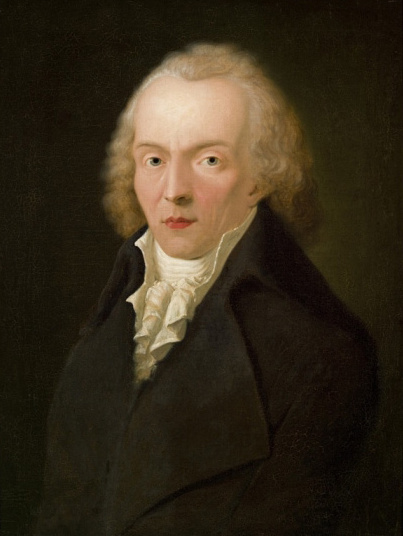

''Bridal procession'' - painting by Ludwig Richter
At the sound of the morning prayer bell, the bridegroom for the din of preparation was disturbing his quiet orison went out into the churchyard, which (as in many other places) together with the church, lay round his mansion like a court. Here, on the moist green, over whose closed flowers the churchyard wall was still spreading broad shadows, did his spirit cool itself from the warm dreams of Earth: here, where the white flat grave stone of his Teacher lay before him like the fallen, in door of the Janus temple of life, or like the windward side of the narrow house, turned toward the tempests of the world: here, where the little shrunk metallic door on the grated cross of his father uttered to him the inscriptions of death, and the year when his parent departed, and all the admonitions and mementos, graven on the lead there, I say, his mood grew softer and more solemn; and he now lifted up by heart his morning prayer, which usually he read, and entreated God to bless him in his office, and to spare his mother's life, and to look with favor and acceptance on the purpose of today. Then, over the graves, he walked into his fenceless little angular flower-garden; and here, composed and confident in the divine keeping, he pressed the stalks of his tulips deeper into the mellow earth.
But on returning to the house, he was met on all hands by the bell-ringing and the Janizary music of wedding gladness; the marriage guests had all thrown off their nightcaps, and were drinking diligently; there was a clattering, a cooking, a frizzling; tea services, coffee services, and warm beer services, were advancing in succession; and plates full of bride cakes were going round like potter's frames or cistern wheels. The Schoolmaster, with three young lads, was heard rehearsing from his own house an Arioso, with which, so soon as they were perfect, he purposed to surprise his clerical superior. But now rushed all the arms of the foaming joy streams into one, when the sky queen be sprinkled with blossoms the bride, descended upon Earth in her timid joy, full of quivering, humble love; when the bells began; when the procession column set forth with the whole village round and before it; when the organ, the congregation, the officiating priest, and the sparrows on the trees of the church-window, struck louder and louder their rolling peals on the drum of the jubilee-festival.
The heart of the singing bridegroom was like to leap from its place for joy "that on his bridal day it was all so respectable and grand." Not till the marriage benediction could he pray a little.
Still worse and louder grew the business during dinner, when pastry work and march pane devices were brought forward, when glasses, and slain fishes (laid under the napkins to frighten the guests) went round, and when the guests rose and themselves went round, and, at length, danced round: for they had instrumental music from the city there.
One minute handed over to the other the sugar bowl and bottle case of joy: the guests heard and saw less and less, and the villagers began to see and hear more and more, and toward night they penetrated like a wedge into the open door, nay, two youths ventured even in the middle of the parsonage court to mount a plank over a beam and commence seesawing. Out of doors, the gleaming vapor of the departed sun was encircling the earth, the evening star was glittering over parsonage and churchyard; no one heeded it.
However, about nine o'clock, when the marriage-guests had well nigh forgotten the marriage pair, and were drinking or dancing along for their own behoof; when poor mortals, in this sunshine of Fate, like fishes in the sunshine of the sky, were leaping up from their wet cold element; and when the bridegroom under the star of happiness and love, casting like a comet its long train of radiance over all his heaven, had in secret pressed to his joy-filled breast his bride and his mother, then did he lock a slice of wedding bread privily into a press, in the old superstitious belief that this residue secured continuance of bread for the whole marriage. As he returned, with greater love for the sole partner of his life, she herself met him with his mother, to deliver him in private the bridal nightgown and bridal shirt, as is the ancient usage. Many a countenance grows pale in violent emotions, even of joy. Thiennette's wax face was bleaching still whiter under the sunbeams of Happiness. O, never fall, thou lily of Heaven, and may four springs instead of four seasons open and shut thy flower bells to the sun ! All the arms of his soul, as he floated on the sea of joy, were quivering to clasp the soft warm heart of his beloved, to encircle it gently and fast, and draw it to his own.
He led her from the crowded dancing room into the cool evening. Why does the evening, does the night, put warmer love in our hearts ? Is it the nightly pressure of helplessness or is it the exalting separation from the turmoil of life, that veiling of the world, in which for the soul nothing more remains but souls; is it therefore that the letters in which the loved name stands written on our spirit appear, like phosphorus writing, by night, in fire, while by day in their cloudy traces they but smoke?
He walked with his bride into the Castle garden: she hastened quickly through the Castle, and past its servants' hall, where the fair flowers of her young life had been crushed broad and dry, under a long dreary pressure; and her soul expanded and breathed in the free open garden, on whose flowery soil destiny had cast forth the first seeds of the blossoms which today were gladdening her existence. Still Eden! Green flower chequered chiaroscuro ! The moon is sleeping under ground like a dead one; but beyond the garden the sun's red evening clouds have fallen down like rose leaves; and the evening star, the brideman of the sun, hovers, like a glancing butterfly, above the rosy red, and, modest as a bride, deprives no single starlet of its light.
The wandering pair arrived at the old gardener's hut, now standing locked and dumb, with dark windows in the light garden, like a fragment of the Past surviving in the Present. Bared twigs of trees were folding, with clammy half formed leaves, over the thick intertwisted tangles of the bushes. The Spring was standing, like a conqueror, with Winter at his feet. In the blue pond, now bloodless, a dusky evening sky lay hollowed out, and the gushing waters were moistening the flower beds. The silver sparks of stars were rising on the altar of the East, and, falling down, were extinguished in the red sea of the West.
The wind whirred, like a night bird, louder through the trees, and gave tones to the acacia-grove; and the tones called to the pair who had first become happy within it: "Enter, new mortal pair, and think of what is past, and of my withering and your own; be holy as Eternity, and weep not only for joy, but for gratitude also!" And the wet-eyed bridegroom led his wet eyed bride under the blossoms, and laid his soul, like a flower, on her heart, and said: "Best Thiennette, I am unspeakably happy, and would say much, but cannot! Ah, thou Dearest, we will live like angels, like children together! Surely I will do all that is good to thee; two years ago I had nothing, no, nothing; ah, it is through thee, best love, that I am happy. I call thee Thou, now, thou dear good soul!" She drew him closer to her, and said, though without kissing him: "Call me Thou always, Dearest!"
And as they stept forth again from the sacred grove into the magic dusky garden, he took off his hat; first, that he might internally thank God, and, secondly, because he wished to look into this fairest evening sky.
They reached the blazing, rustling, marriage-house, but their softened hearts sought stillness; and a foreign touch, as in the blossoming vine, would have disturbed the flower nuptials of their souls. They turned rather, and winded up into the churchyard to preserve their mood. Majestic on the groves and mountains stood the Night before man's heart, and made that also great. Over the white steeple-obelisk the sky rested bluer, and darker; and, behind it, wavered the withered summit of the May-pole with faded flag. The son noticed his father's grave, on which the wind was opening and shutting, with harsh noise, the little door of the metal cross, to let the year of his death be read on the brass plate within. As an overpowering sadness seized his heart with violent streams of tears, and drove him to the sunk hillock, he led his bride to the grave, and said: "Here sleeps he, my good father; in his thirty second year he was carried hither to his long rest. O thou good, dear father, couldst thou today but see the happiness of thy son, like my mother! But thy eyes are empty, and thy breast is full of ashes, and thou seest us not." He was silent. The bride wept aloud; she saw the moldering coffins of her parents open, and the two dead arise and look round for their daughter, who had stayed so long behind them, forsaken on the earth. She fell upon his heart, and faltered: "O beloved, I have neither father nor mother. Do not forsake me!"
O thou who hast still a father and a mother, thank God for it, on the day when thy soul is full of joyful tears and needs a bosom whereon to shed them.
And with this embracing at a father's grave, let this day of joy be holily concluded.

Jean Paul - born Johann Paul Friedrich Richter, (1763 – 1825) was a German Romantic writer, best known for his humorous novels and stories.

No comments:
Post a Comment